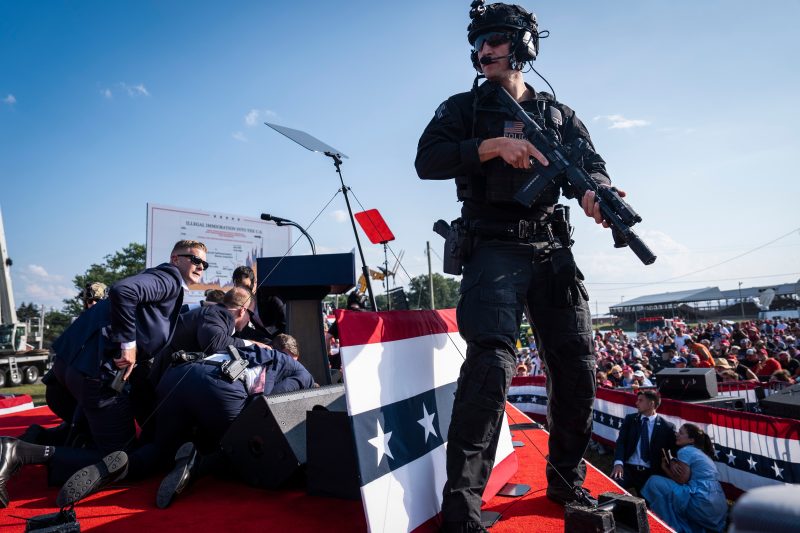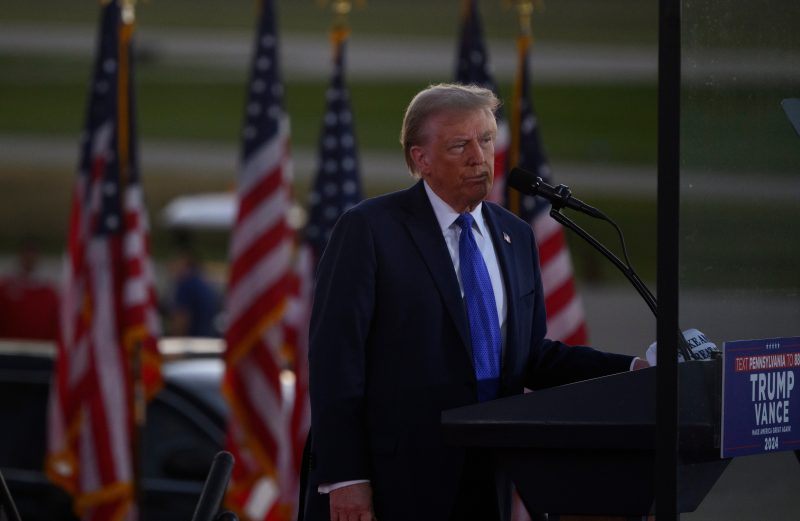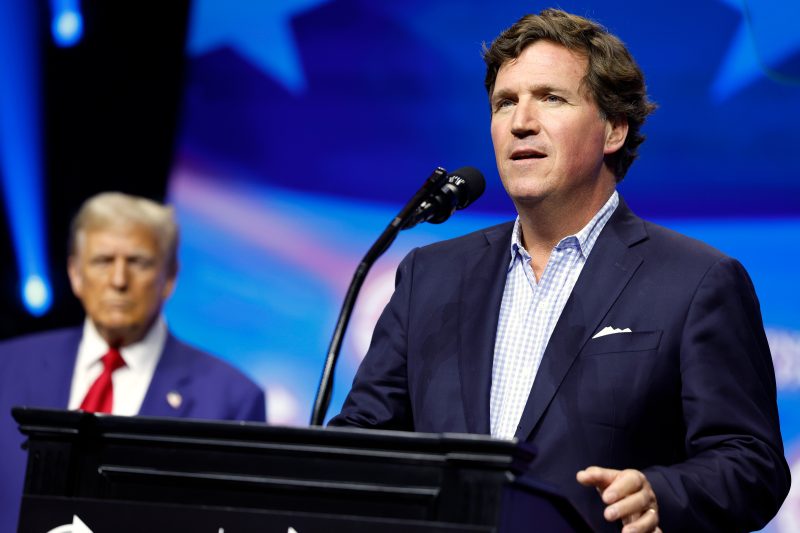Panel formed after Trump rally shooting calls for Secret Service shake-up

An independent panel called Thursday for new leadership at the Secret Service, hired mostly from outside the protective agency, saying it needs a major shake-up or security failures such as the July 13 shooting at Donald Trump’s rally in Pennsylvania “can and will happen again.”
The bipartisan panel, ordered by President Joe Biden to review the Secret Service after a gunman attempted to assassinate Trump at a campaign rally in Butler, Pa., said the protective agency had become “bureaucratic, complacent and static.”
The panel expressed gratitude for agents who risk their lives to protect the president, vice president and other top officials but found significant leadership and cultural failures that put officials at risk, including a lack of critical-thinking skills. The panel recommended that the administration replace the top leadership “as soon as practicable” and urged that most appointees come from outside the agency.
In its 52-page report, the panel wrote that “the Secret Service as an agency requires fundamental reform to carry out its mission. Without that reform, the Independent Review Panel believes another Butler can and will happen again.”
Secret Service leaders have acknowledged the failures leading to July 13, when agents and law enforcement were notified of Thomas Matthew Crooks, the 20-year-old gunman, well before he fired eight shots at the rally, killing one man and injuring Trump and several others. A Secret Service sniper killed Crooks.
The July attack was the first direct hit on a U.S. leader since the shooting of President Ronald Reagan in front of the Washington Hilton in 1981.
Kimberly Cheatle, a former agent who had served on Biden’s detail when he was vice president, resigned as director after the Trump rally shooting. Acting director Ronald L. Rowe Jr., her former deputy, has acknowledged complacency inside the agency and said he is seeking a bigger budget to improve training and expand hiring.
The panel said that wasn’t enough: An outsider should lead the agency — similar to a recommendation a decade earlier — and it should move its investigative operations into the Office of Protective Operations to ensure its core, “no fail” mission to protect officials is fully staffed.
“The Secret Service must be the world’s leading governmental protective organization. The events at Butler on July 13 demonstrate that, currently, it is not,” the panel said in the report. “All assets should be allocated to that mission before any other tasks. … There is simply no excuse to need to ‘do more with less’ concerning protection of national leaders.”
The recommendations are among the most sweeping changes proposed for the Secret Service in its 159-year history. The agency was created in 1865 under the U.S. Treasury Department to investigate counterfeiting and began protecting presidents at Congress’s request after the 1901 assassination of President William McKinley.
Since then, the agency has expanded into a force with roughly 8,000 employees, including thousands of armed officers and agents in charge of protecting more than 40 people around-the-clock, securing special events such as the United Nations General Assembly, the upcoming Olympics in Los Angeles and visits by foreign leaders.
Its investigative division — which the panel would transfer under the protective office — has hundreds of employees probing financial crimes such as counterfeiting, hacking and money laundering, as well as scams. It also investigates cases involving missing children.
The panel did not discuss in depth a Sept. 15 incident in Florida, where an agent spotted an armed man hiding in a tree line while Trump was golfing. No one was injured. The suspect, Ryan Routh, has been charged with attempting to kill Trump, the Republican nominee for president.
Four national security experts led the independent review: former Department of Homeland Security secretary Janet Napolitano, who served in the Obama administration; Frances Townsend, a homeland security adviser under President George W. Bush; David Mitchell, a former top state law enforcement official in Maryland and Delaware; and Mark Filip, Bush’s deputy attorney general and a former federal judge.
Nearly a decade ago, another independent four-member panel called for sweeping changes in the agency, including outside leadership to challenge its culture.
Filip was part of that review, which also urged better training, the hiring of hundreds of new agents and newer facilities so that agents could train in lifelike scenarios — similar to the changes Rowe has called for in recent weeks.
In 2015, a two-year bipartisan House investigation called for an outsider to be named director, saying the agency’s insular culture was resistant to change. Officials had bungled hiring and firing and should reduce the agency’s sizable investigative mission to better focus on protecting officials, the report said.
Agents were desperate for a new leader willing to implement reforms, the report said.
Trump appointed Secret Service Director Randolph D. “Tex” Alles in 2017. The retired Marine Corps general and acting deputy commissioner of Customs and Border Protection was the first outsider in at least 100 years — and Trump replaced him with a career Secret Service official, James M. Murray, in 2019.
The 2014 and 2015 reports followed a series of security blunders under the Obama administration that led Director Julia Pierson to resign, after she failed to inform the president that an armed security guard with a criminal history had been allowed to ride in an elevator with him the month before.
In other incidents, an Army veteran carrying a knife jumped the White House perimeter fence and charged through an unlocked door in 2014, agents preparing for a presidential trip to Colombia spent a night carousing with prostitutes in 2012, and agents failed to immediately detect a man who fired a semiautomatic weapon at the White House residence in 2011, while Obama’s daughter Sasha was home.
After July 13, the service acknowledged that security breakdowns led to the attack on Trump, including problems with equipment, a lack of extra security measures such as protective glass, and the failure of agents to give clear instructions to local and state police backing them up.
A bipartisan Senate report found in September that in the aftermath of the Butler shooting, some agents denied responsibility or “deflected blame” for the security failures at the rally.
The panel found similar problems with agents who were aware Crooks was suspected of posing a threat but failed to question him or alert the agents guarding Trump to prevent him from taking the stage.
For instance, the panel said that based on the evidence, “no fewer than nine” Secret Service agents, as well as other law enforcement personnel at the rally, knew Crooks was acting suspiciously before he began shooting, yet nobody questioned him before Trump took the stage. Four Secret Service staff members were told that Crooks was on the roof of a building with a clear view of Trump, but nobody warned the team guarding the former president about the threat.
Agents lacked critical-thinking skills, they said, noting that Trump was the presumptive nominee and one who generates “strong emotions in many people,” so he should have had greater security on July 13.
The panel said it “did not identify any nefarious or malicious intent behind this phenomenon, but rather an overreliance on assigning personnel based on categories,” such as whether a protected person was a former official, a candidate or a nominee “instead of an individualized assessment of risk.”
Though the Secret Service has said it is conducting an internal investigation and carrying out reforms, the panel found that many agents involved in July 13 “appear to have done little in the way of self reflection in terms of identifying areas of missteps, omissions, or opportunities for improvement.”
The panel said it based its report on research and 58 interviews, including with the Secret Service and federal, state and local law enforcement from early August through the start of this month. It also received briefings from the Secret Service, the Department of Homeland Security and the FBI, traveled to Butler and read thousands of pages of documents.
The service has said it has boosted Trump’s security to the highest levels, adding agents and equipment such as protective glass at events. Typically, the president, vice president and other top officials receive the most security, but the Secret Service has said Trump now has security comparable to that of the sitting president.
Carol D. Leonnig contributed to this report.
This is a developing story.




